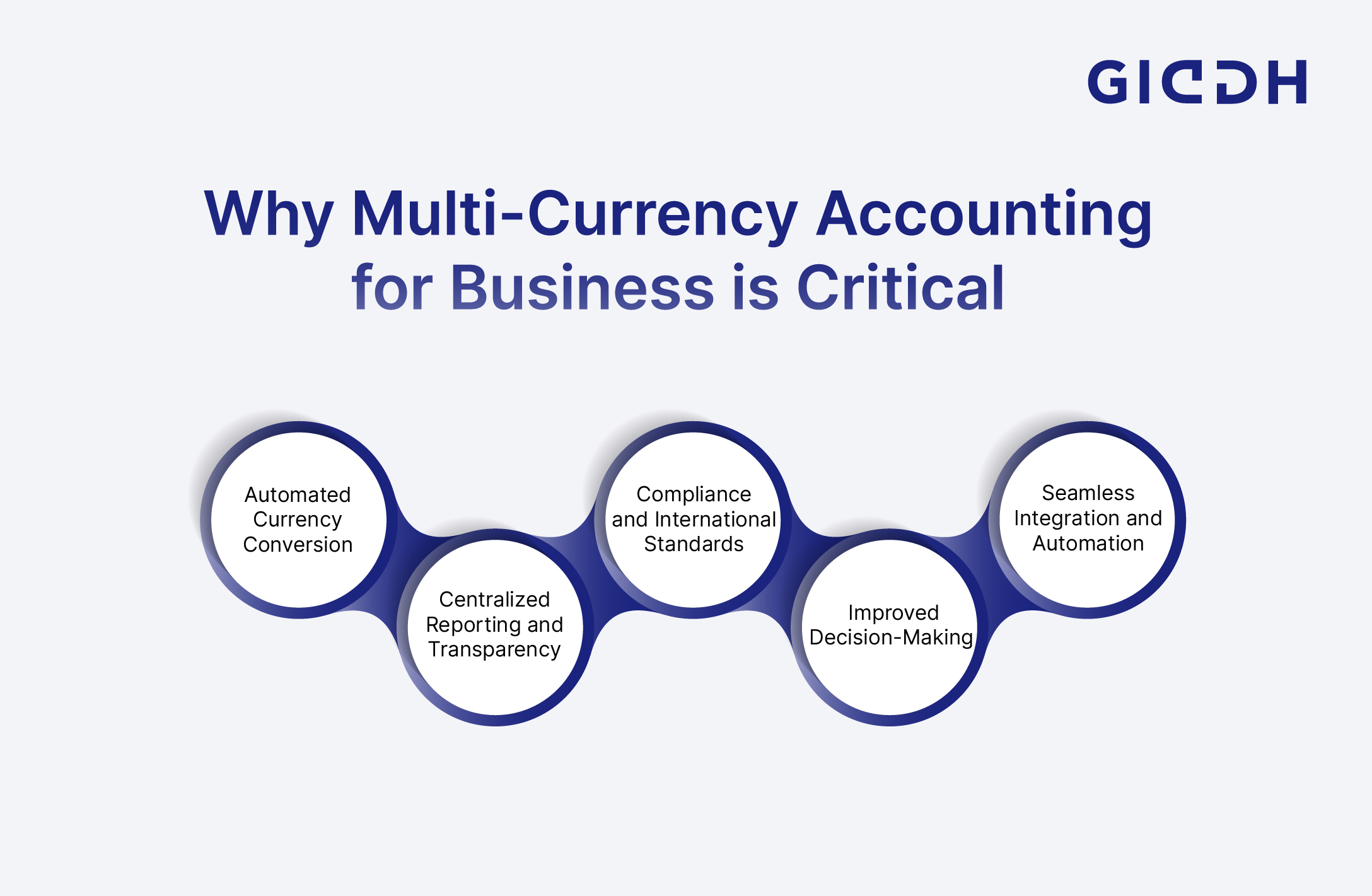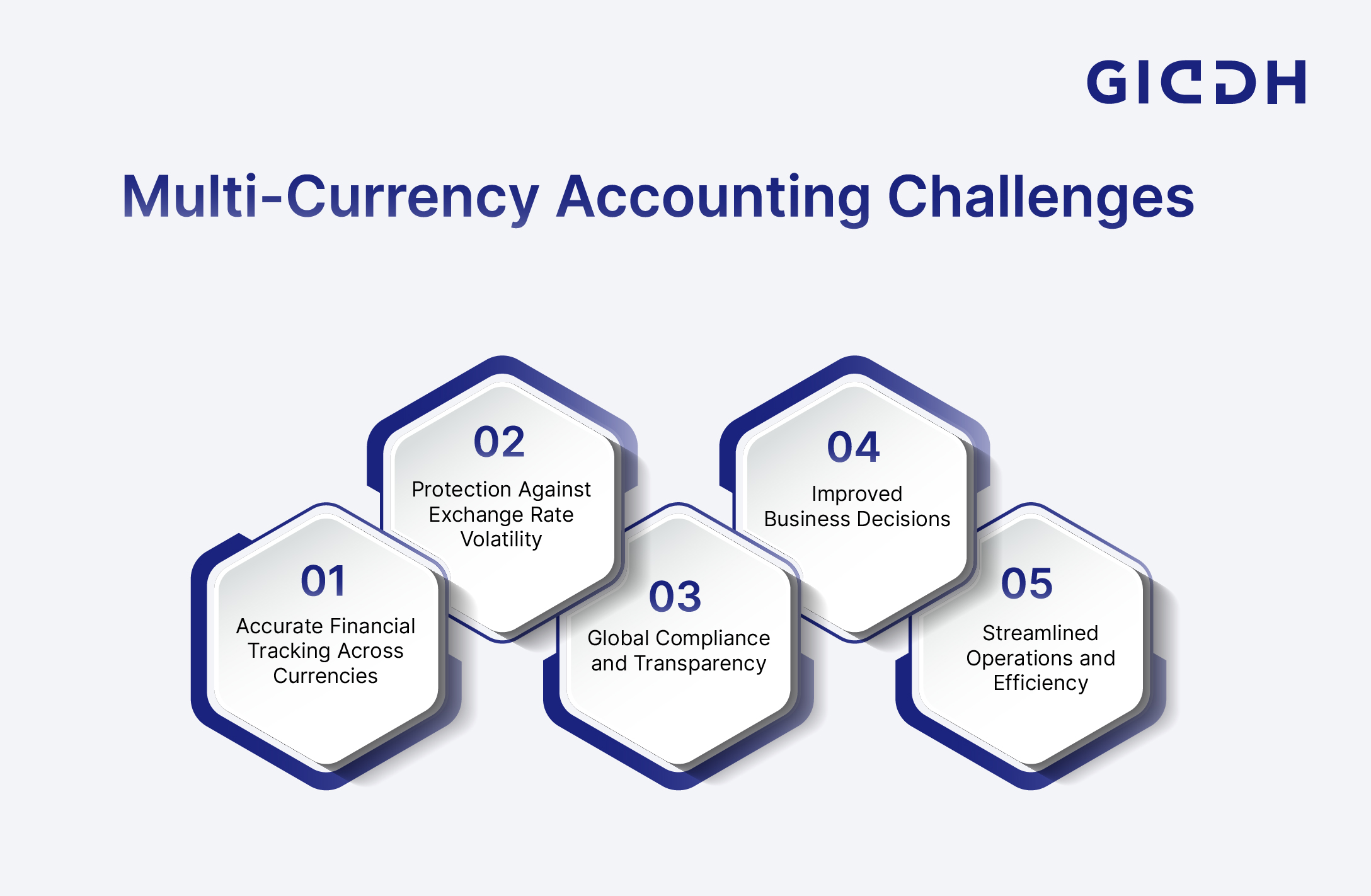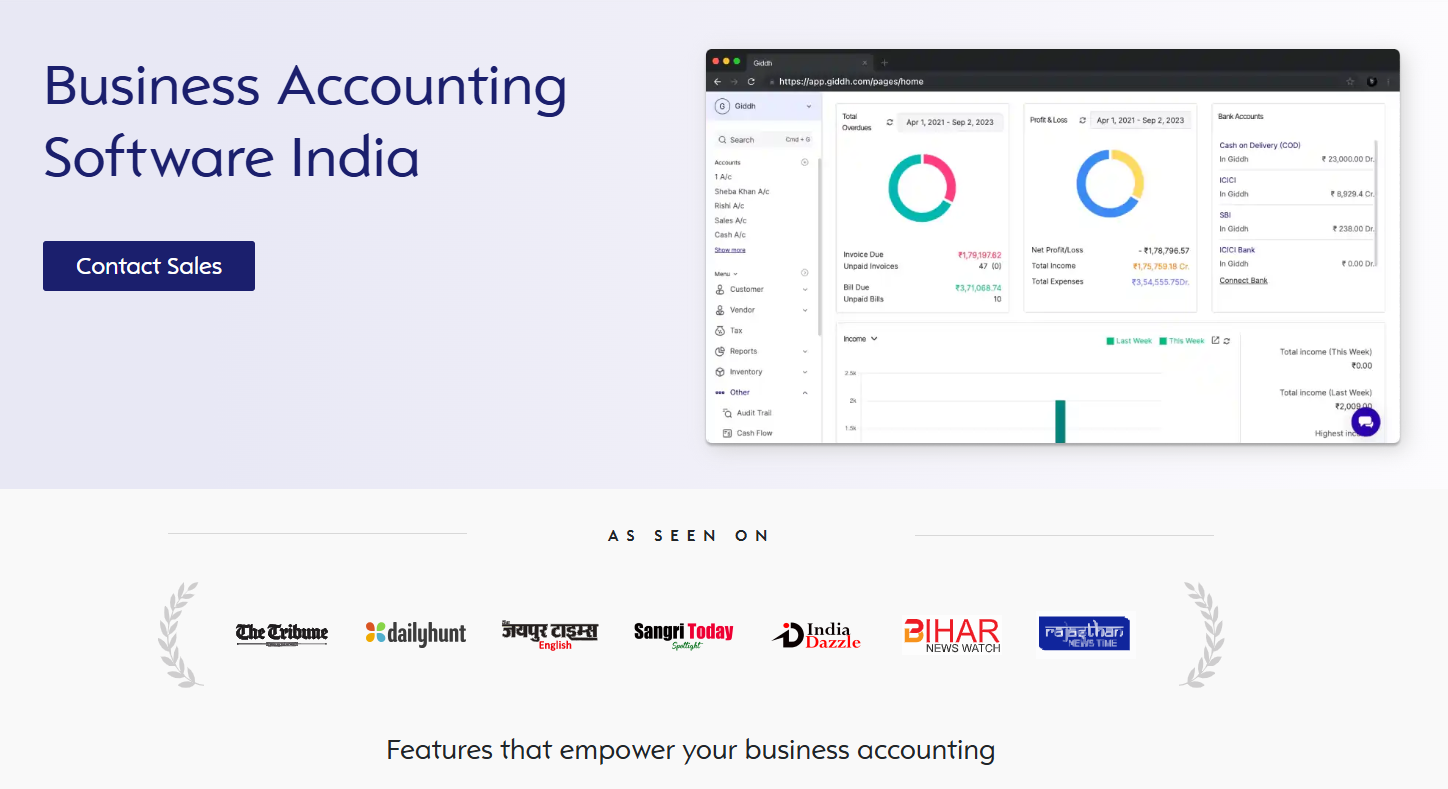Why Businesses With Global Clients Need Multi-Currency Accounting

As businesses expand across borders, managing finances in multiple currencies becomes increasingly complex. For companies engaging with international clients, managing various currencies effectively can significantly impact financial accuracy and decision-making.
However, many business owners and accountants face challenges like inaccurate currency conversion, costly errors, and compliance risks when handling cross-border transactions.
In this blog, we’ll explore the importance of multi-currency accounting for businesses that operate globally, outlining how it can streamline financial processes and reduce operational risks.
For Indian companies aiming to grow their international presence, adopting a solid multi-currency accounting system is no longer optional, but a key to financial success.
What is Multi-Currency Accounting?
Multi-Currency Accounting refers to an accounting system that supports financial transactions in multiple currencies.
It allows businesses to:
-
Record income, expenses, and invoices in different currencies
-
Automatically convert amounts using real-time exchange rates.
-
Generate reports in a base currency for accurate financial analysis.
-
Track foreign currency gains or losses.
This is essential for businesses dealing with international clients, suppliers, or subsidiaries, ensuring compliance, accuracy, and clear financial visibility across borders.
Basic Concept:
-
Currency Conversion: Accurately tracking and converting various currencies to reflect real-time exchange rates.
-
Profit and Loss Management: Managing profits and losses in each currency and converting them to a base currency (such as INR for Indian businesses).
-
Compliance: Ensuring tax and regulatory compliance for businesses operating across different regions.
Examples:
-
Exporting Businesses: A company based in India that exports goods to the U.S. must deal with USD, while also tracking expenses in INR.
-
Global Service Providers: A digital agency with clients in Europe and Australia might need to handle EUR and AUD payments alongside INR.
Why is Multi-Currency Accounting Crucial for Businesses?

With India’s increasing integration into the global economy, many businesses are venturing into international markets. Multi-currency accounting plays a critical role in simplifying this process and ensuring that financial records remain accurate and compliant. However, managing finances across different currencies can present several challenges:
1. Accurate Financial Tracking Across Currencies
Without a proper system, tracking transactions in different currencies can quickly become confusing and error-prone. Multi-currency accounting automatically converts and records transactions based on live exchange rates.
-
Prevents errors caused by manual currency conversions
-
Maintains consistency in financial records
-
Provides a clear view of profitability in a single base currency
2. Protection Against Exchange Rate Volatility
Currency values fluctuate constantly, impacting revenue, expenses, and overall profitability. A multi-currency system allows businesses to monitor these fluctuations in real time.
-
Calculates foreign exchange gains and losses accurately
-
Helps plan pricing and cash flow strategies
-
Minimizes financial risks from sudden currency swings
3. Global Compliance and Transparency
Operating across borders means following different tax regulations and reporting standards. Multi-currency accounting ensures compliance with both local and international accounting standards like IFRS or GAAP.
-
Simplifies tax reporting for each country
-
Offers a transparent audit trail for global transactions
-
Reduces compliance risks and penalties
4. Improved Business Decisions
With real-time currency data and consolidated reporting, business owners and finance teams gain valuable insights.
-
Better forecasting and budgeting
-
Informed decisions on expanding into new markets
-
More intelligent resource allocation based on accurate cost analysis
5. Streamlined Operations and Efficiency
Multi-currency accounting integrates seamlessly with payment systems, invoicing tools, and CRMs, reducing manual work.
-
Faster invoice generation in the customer’s local currency
-
Automated reconciliation of international payments
-
Time-saving for accounting teams
What Challenges Do Indian Businesses Face?
-
Currency Conversion Errors: Manual conversion between multiple currencies can result in errors, leading to inaccurate financial records.
-
Tracking Profit and Loss Across Multiple Currencies: Businesses often struggle to calculate profits and losses when operating in different currencies accurately.
-
Maintaining Compliance: International laws and regulations around cross-border transactions vary widely and can change frequently.
How Do Multi-Currency Accounting Systems Solve These Challenges?

Managing finances across different currencies comes with several challenges—fluctuating exchange rates, complex tax regulations, and the risk of errors in manual conversions. Multi-currency accounting systems address these issues by providing a streamlined, automated approach that reduces complexity and ensures accuracy.
1. Automated Currency Conversion
One of the biggest hurdles in global transactions is dealing with exchange rates that change daily. Multi-currency accounting software automatically applies the latest rates when recording transactions, eliminating manual calculations.
-
Accurate real-time conversions
-
Reduced risk of miscalculations
-
Consistent reporting in a chosen base currency
2. Centralized Reporting and Transparency
When businesses operate in multiple countries, consolidating financial data can be challenging. Multi-currency systems offer centralized dashboards that bring all financial information together.
-
Consolidated profit and loss reports across currencies
-
Transparent view of cash flow in real time
-
Faster month-end and year-end closing processes
3. Compliance with Local and International Standards
Each country has its own tax rules, reporting requirements, and currency regulations. A multi-currency system supports compliance by adapting reports and tax calculations based on local laws.
-
Country-specific tax handling
-
Compliance with international accounting standards (IFRS, GAAP)
-
Reduced audit risks through accurate, traceable records
4. Improved Decision-Making
With better insights into currency fluctuations and profitability, decision-makers can respond quickly to financial risks.
-
Early detection of foreign exchange gains or losses
-
Better budgeting and forecasting
-
Data-driven strategy for global expansion
5. Seamless Integration and Automation
Modern multi-currency accounting platforms integrate with CRMs, ERPs, and payment gateways, ensuring that data flows smoothly across systems.
-
Automatic syncing of international invoices and payments
-
Reduced manual data entry
-
Increased efficiency for accounting teams
Introducing Giddh: Simplify Your Multi-Currency Accounting
Giddh offers a robust cloud-based accounting solution that streamlines multi-currency accounting for businesses operating in India and internationally. It enables businesses to manage transactions in various currencies, ensuring accuracy, compliance, and financial efficiency.
Key Features of Giddh:
- Multi-Currency Support: Seamlessly manage transactions across multiple currencies with real-time exchange rate updates.
- Automatic Currency Conversion
-
Giddh automatically converts international currencies into your base currency.
-
Option to manually adjust exchange rates when needed.
- Easy International Invoicing
-
Send invoices in your customer's preferred currency.
-
Keep your business books updated in your base currency.
- Set Default Currency for Clients
-
Assign a preferred currency to each foreign customer’s account.
-
All invoices and reports for that customer are generated in the selected currency.
- Dynamic Financial Reporting
-
Generate financial reports (trial balance, profit & loss, balance sheet) in your base currency.
-
Get an accurate view of your financial position and cash flow.
-
Accurate Financial Reporting: Automatically generate accurate financial reports, including profit & loss statements, balance sheets, and cash flow reports.
Example: Giddh generates detailed reports for each currency and automatically converts them into your base currency for easy analysis.
- Compliance Made Easy: Giddh ensures compliance with local Indian tax regulations (like GST and income tax) as well as international standards (IFRS, GAAP).
Example: Businesses can easily file taxes in different regions with accurate financial records and reports, reducing the risk of non-compliance.
- Integration with Bank Accounts: Sync your business's bank accounts to track payments, receipts, and other transactions across various currencies in real time.
Example: Giddh integrates with your bank account, making it easy to reconcile payments made in foreign currencies.
Conclusion
Managing finances across multiple currencies can be a daunting task for businesses with international clients, but with the right tools, the process can be streamlined and automated. By adopting a multi-currency accounting system like Giddh, businesses can reduce errors, stay compliant, and improve financial decision-making.
Indian businesses expanding internationally must not only focus on revenue growth but also on efficient and accurate financial management. Giddh's multi-currency accounting solution strikes the perfect balance between simplicity and sophistication, enabling businesses to grow globally with ease.
Sign up with Giddh’s multi-currency solution today and ensure your business stays ahead of the curve in the global marketplace.


